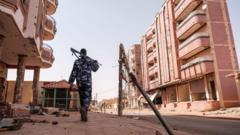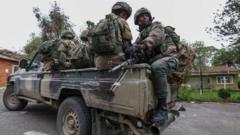Conflict in southern Lebanon escalates as Israeli military confronts civilians despite ongoing negotiations for peace.
Tensions Escalate as Israeli Forces Fire on Returning Lebanese Residents

Tensions Escalate as Israeli Forces Fire on Returning Lebanese Residents
For the second consecutive day, Lebanese residents are met with Israeli gunfire while attempting to return home amidst a volatile cease-fire situation.
Israeli forces opened fire on residents of southern Lebanon for the second day in a row on January 27, 2025, as civilians continued to make efforts to return to their homes along the border. This follows a tragic incident the previous day where at least 24 individuals lost their lives and over 134 were reported injured during Israeli strikes, according to Lebanese officials. The Israeli military's actions mark the most significant violence in the region since the truce between Israel and Hezbollah was established in November.
As residents pressed on towards their communities, Israeli gunfire injured two more individuals, including a child, as confirmed by Lebanon’s health ministry. The Israeli military responded by stating they had redeployed in southern Lebanon and repeatedly urged Lebanese residents to await approval before approaching their homes. Meanwhile, the Lebanese military had dispatched reinforcements to ensure the safety of civilians in areas facing potential violence.
The unfortunate events on Sunday coincided with thousands of Lebanese residents marching back to southern towns, which still remain occupied by Israel past a 60-day withdrawal deadline outlined in the November cease-fire. Under the terms of this agreement, both Israeli and Hezbollah forces were to vacate southern Lebanon while the Lebanese Army and U.N. peacekeepers took control of the area.
The Israeli military labeled those marching as "rioters," asserting they had fired "warning shots" to disperse crowds. Despite assurances from the White House that negotiations over a potential permanent settlement would lead to a more stable peace, the expiration of the 60-day deadline sparked a flurry of diplomatic activity, culminating in an extension of the cease-fire agreement until February 18.
Calls for restraint have intensified from the U.N. as fears of prolonged Israeli occupation grow, alongside the threat of renewed hostilities between Israel and Hezbollah. In a somewhat restrained response to the violence, Hezbollah refrained from issuing typical calls for retribution, instead urging the international community to press Israel for a complete withdrawal from Lebanese territory, emphasizing a desire for de-escalation rather than further conflict.
Euan Ward, contributing reporter from Beirut, continues to follow the ongoing crisis in the region.






















